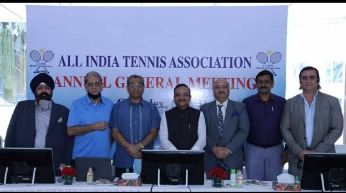New Delhi, Oct 10 (UNI) Objective of 100-days campaign launched under the Jal Jeevan Mission on the occasion of Gandhi Jayanti, is to ensure water security in all schools an Anganwadi centres, Ministry of Jal Shakti has said.
The 100 days campaign aims to provide piped water supply in Anganwadi Centres, Ashramshalas (tribal residential hostels for children) and schools essentially highlights water, sanitation and hygiene issues and its interplay with children’s well-being and their long-term development, the Ministry said in its official data here.
Jal Jeevan Mission (JJM) aims at the universal coverage of provision of tap water connection to every rural home by 2024.
Goa has earned itself the unique distinction of becoming the first ‘Har Ghar Jal’ State in the country as it successfully provides 100 per cent Functional Household Tap Connections (FHTCs) in the rural areas covering 2.30 lakh rural households, read the statement.
According to the Ministry, one of the objectives of the campaign is to plan and achieve overall water security in all anganwadi centres, ashramshalas and schools for purposes of drinking, cooking mid-day meals, handwashing and toilet use.
On October 2, Union Minister of Jal Shakti Gajendra Singh Shekhawat launched the special mission mode campaign to provide potable piped water supply in all Schools and Anganwadi Centres across the nation within a short span of 100 days.
This mission was envisaged by Prime Minister Narendra Modi on September 29 while releasing the ‘Margdarshika’ for Gram Panchayats and Paani Samitis for implementation of Jal Jeevan Mission (JJM).
The Prime Minister spoke about launching of ‘100 days campaign’ on October 2 to ensure piped safe water in schools and anganwadi centres across the country.
He also appealed to the States to make best use of this campaign to ensure provision of potable piped water supply in these public institutions. Ensuring safe water to children is a priority, as they are the most vulnerable to water-borne diseases, therefore provisions have been made under Jal Jeevan Mission for ensuring safe water through tap water connection in schools, anganwadi centres, ashramshalas, health care centres, etc.
During this 100 Days campaign, concerted efforts will be made to ensure piped water supply in all anganwadi centres, ashramshalas, and schools.
The other aims of the scheme is to discuss and bring awareness among rural community, anganwadi workers, school teachers, school management committees, etc about the importance of Water, Sanitation & Hygiene (WASH) and assured availability of safe water to children for their overall development.
Another objective is to make arrangements for rainwater harvesting for source sustainability; and to make water ‘everyone’s business’ by forging effective partnerships with all stakeholders, the statement said.
Key components of the campaign is provision of water quality monitoring at delivery point within institutional premises; strengthening and developing a system for water quality testing in higher secondary schools having chemistry labs and water quality surveillance in anganwadi centres, ashramshalas, and schools.
Planning is important as this is an action and specific output-oriented time-bound 100 day campaign.
Currently, villages across the country are at different stages of planning and finalisation of their Village Action Plans (VAPs) and Gram Panchayat Development Plans (GPDPs). Districts are in the process of finalising their District Action Plans (DAPs).
The States/ UTs have already planned and finalised their timelines, within which they will provide piped water supply of adequate quantity and of prescribed quality to all households in the States/ UTs.
Planning may also include rainwater harvesting especially in arid, semi-arid, hilly, forested, desert, drought-prone and water-stressed areas; greywater treatment and reuse; and water quality monitoring and surveillance.
To make water ‘everyone’s business’, there is a need to focus on children to bring awareness on different aspects of handling of water. Teachers have an important role in leading this movement in schools.
Beyond the classroom, there are many more opportunities to sensitize children about water in a participatory manner. The topic of water conservation can be made interesting and important so as to make children ‘JJM champions’.














